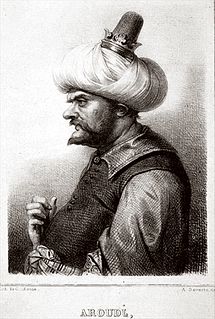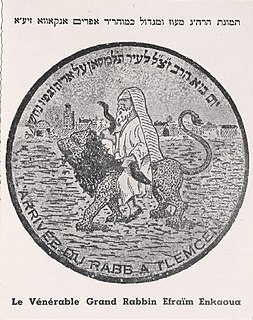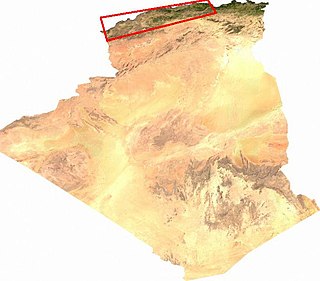
Medieval Muslim Algeria was a period of Muslim dominance in Algeria during the Middle Ages, roughly spanning the millennium from the 7th century to the 17th century. Unlike the invasions of previous religions and cultures, the coming of Islam, which was spread by Arabs, was to have pervasive and long-lasting effects on North Africa. The new faith, in its various forms, would penetrate nearly all segments of society, bringing with it armies, learned men, and fervent mystics; in large part, it would replace tribal practices and loyalties with new social norms and political idioms.

Tlemcen is a city in north-western Algeria, and the capital of the province of the same name. The city has developed leather, carpet, and textile industries, which it ships to the port of Rashgun for export. It had a population of 140,158 at the 2008 census, while the province had 949,135 inhabitants.
The Zayyanid dynasty or Abd al-Wadids was a Berber Zenata dynasty that ruled the Kingdom of Tlemcen, an area of northwestern Algeria, centered on Tlemcen. The territory stretched from Tlemcen to the Chelif bend and Algiers. At its zenith, the kingdom reached the Moulouya river to the west, Sijilmasa to the south, and the Soummam river to the east. The Zayyanid dynasty's rule lasted from 1235 to 1556.

Andalusian classical music is a style of Arabic music found in different styles across the Maghreb and the Levant. It originated out of the music of Al-Andalus between the 9th and 15th centuries. Some of its poems were found to be composed by authors such as Al-Shushtari, Ibn al-Khatib and Al-Mu'tamid ibn Abbad.

Mers El Kébir is a port on the Mediterranean Sea, near Oran in Oran Province, northwest Algeria. It is famous for the attack on the French fleet in 1940, in the Second World War.

The Marinid dynasty or Banu abd al-Haqq was a Sunni Muslim dynasty of Zenata Berber descent that ruled Morocco from the 13th to the 15th century.

Abu Al-Hasan 'Ali ibn 'Othman was a sultan of the Marinid dynasty who reigned in Morocco between 1331 and 1348. In 1333 he captured Gibraltar from the Castilians, although a later attempt to take Tarifa in 1339 ended in fiasco. In North Africa he extended his rule over Tlemcen and Ifriqiya, which together covered the north of what is now Algeria and Tunisia. Under him the Marinid realms in the Maghreb briefly covered an area that rivaled that of the preceding Almohad Caliphate. However, he was forced to retreat due to a revolt of the Arab tribes, was shipwrecked, and lost many of his supporters. His son Abu Inan Faris seized power in Fez. Abu Al-Hasan died in exile in the High Atlas mountains.

The regency of Algiers, was a vassal state of the Ottoman Empire in North Africa lasting from 1515 to 1830, when it was conquered by the French. Situated between the regency of Tunis in the east and the Sharifian Empire in the west, the Regency originally extended its borders from La Calle to the east to Trara in the west and from Algiers to Biskra, and after spread to the present eastern and western borders of Algeria.

Oruç Reis was an Ottoman bey (governor) of Algiers and beylerbey of the West Mediterranean, and the elder brother of Hayreddin Barbarossa. He was born on the Ottoman island of Midilli and was killed in battle against the Spanish at Tlemcen in the Ottoman Eyalet of Algeria.

Maghnia is a town in Tlemcen Province, northwestern Algeria. It is the second most populated town in Tlemcen Province, after Tlemcen. The current population is over 200,000.

Widad Athletic Tlemcen, known as WA Tlemcen or WAT for short, is an Algerian football club based in Tlemcen. The club was founded in 1962 and its colours are blue and white. Their home stadium, Stade Akid Lotfi, has a capacity of some 18,000 spectators. The club is currently playing in the Algerian Ligue Professionnelle 2.

Abu Inan Faris was a Marinid ruler of Morocco. He succeeded his father Abu al-Hasan Ali ibn Othman in 1348. He extended his rule over Tlemcen and Ifriqiya, which covered the north of what is now Algeria and Tunisia, but was forced to retreat due to a revolt of Arab tribes there. He died strangled by his vizier in 1358.

Rabbi Ephraim ben Israel Alnaqua (1359-1442) was a physician, rabbi, theological writer, and founder of the Jewish community at Tlemçen (Algeria), where he died in 1442.
The Ifranids, also called Banu Ifran, Ifran, or the children of the Ifran, were a Zenata Berber tribe prominent in the history of pre-Islamic and early Islamic North Africa. In the 8th century, they established a kingdom in Central Maghreb, Algeria with Tlemcen as its capital.

Algerian wine is wine made in Algeria. While not a significant force on the world's wine market today, Algeria has played an important role in the history of wine. Algeria's viticultural history dates back to its settlement by the Phoenicians and continued under Algeria's rule by the Roman empire. Just prior to the Algerian War of Independence, Algerian wine accounted for nearly two-thirds of the total international wine trade. With as much land under vine as the countries of Germany and South Africa, Algeria continues to maintain a wine industry with over 70 wineries in operation.
Jijeli, or Jijel Arabic, is a variety of Arabic spoken specifically in the Jijel Province in northeastern Algeria, but traces of it reach parts of the neighboring Skikda and Mila Provinces. It is quite different from all the other Arabic dialects spoken in eastern Algeria and has probably survived into present times because of the geographic enclavement of that mountainous area and the difficulty of terrestrial connections with the rest of the country for centuries.
The Fall of Tlemcen occurred in 1518, when the Ottoman admiral Oruç Barbarossa captured the city of Tlemcen from its sultan, Abu Zayan, the last member of the Banu Zayan lineage.

Turkey–Morocco relations covers relations between Morocco and Turkey, and spanned a period of several centuries, from the early 16th century to the 19th century when Northern Africa was taken over by France, until modern times.

The Kingdom of Tlemcen or Zayyanid Kingdom of Tlemcen was a Berber kingdom in what is now the northwest of Algeria. Its territory stretched from Tlemcen to the Chelif bend and Algiers, and reached at its zenith the Moulouya River to the west, Sijilmasa to the south and the Soummam river to the east.
Ibn Marzuq was a prominent the 14th century scholar from Tlemcen.















